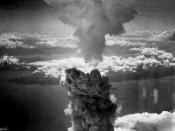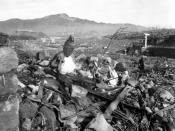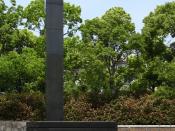Towards the end of World War II with casualties high and morale low the U.S. military decided to unleash the most destructive weapon the world has ever seen. The atomic bomb was a newly developed weapon able of causing destruction beyond any weapon before it. Two of these bombs were dropped on Japanese cities. The first on Hiroshima on August 6th, 1945 and the second on Nagasaki on August 9th, 1945. The immediate devastation of the atomic bombs on Hiroshima and Nagasaki was the only display of power that would cause the surrender of Japan.
The psychological effects alone left a mark like no other. The U.S bombing survey sums up the immediate reaction to the bombings, "The primary reaction to the bomb was fear-uncontrolled terror, strengthened by the sheer horror of the destruction and suffering witnessed and experienced by the survivors (Clancy 2)." But after the initial jolt of the bombings set in, several reactions formed.
Some were terror, and worry of yet another bombing. As one resident of Japan said, "After the atomic bomb fell, I just couldn't stay home. I would cook, but while cooking I would always be watching out and worrying whether an atomic bomb would fall near me (Clancy 2)." Many people like this were shook by the sheer destruction of the bombs. But some people had a different reaction; they had a burst of patriotism. One Japanese man stated, "After the atomic bomb exploded, I felt I now must go to work in a munitions plant. My sons told me they wouldn't forget the atomic bomb even when they grow up Clancy 2)." Although less, but still many Japanese citizens had a reaction similar to this, the bombs only reinstalled their patriotic feeling.
Even more devastated were the survivors of the bombings of...


